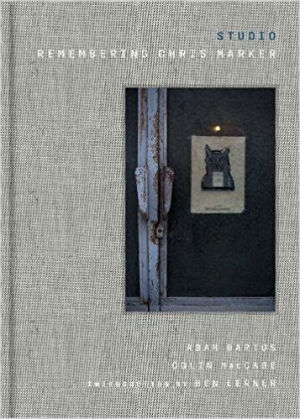
Chris Marker, the innovative, left-wing filmmaker, is given a moving and insightful tribute in Studio: Remembering Chris Marker, finds Tom Griffiths

Adam Bartos and Colin MacCabe, Studio: Remembering Chris Marker (O/R Books 2017), 58pp, colour, 8 gatefolds.
There is hardly a filmmaker more formally daring and inventive as Chris Marker (1921-2012). The Frenchman, who claimed to be from Mongolia, or indeed outer space, and took an Anglo-American nom de plume, was perhaps the ultimate twentieth-century Renaissance man. Writer, journalist, adventurer, photographer, multi-media artist and director, Marker was someone who not only fell between the cracks of standard categorisation, but settled into them comfortably like the cats he loved so much pouring themselves into unlikely corners.
Marker is perhaps most famous for what is widely accepted to be the best short film ever made, La Jettée, (which is also arguably one of the best science-fiction films ever made), Sans Soleil (perhaps the finest example of the ‘essay film’; a genre which he also invented), Grin Without a Cat, an incendiary account of the rise and fall of revolutionary fervour in the middle of the twentieth century, and many other ground breaking works on CD Rom and Video.
The influence he had over filmmakers as wide ranging as Francis Ford Coppola, Terry Gilliam, Joanna Hogg, Patrick Keiller and Jean-Luc Godard was also immense, but even that was a two-way conversation, for Marker himself was as much a film-fanatic and super-fan as he was a creator. A champion of Hitchcock and film noir along with many of his French contemporaries, he also made important and powerful documentaries about Akira Kurosawa and Andrei Tarkovsky.
The photographs of his studio in the new book, Studio: Remembering Chris Marker by Adam Bartos and Colin MacCabe, are an absolute joy, the more so because they are exactly as you would imagine they would be. Signed autographs from Kim Novak, the star of his favourite film Vertigo, jostle for space on crammed bookshelves with toy cats in masks made out of VHS tapes. Images of cats, naturally, abound; his affection for his feline friends is well known, as is the fact he was stubbornly reclusive. While these images were taken when he was still alive, he is, of course, absent from every frame.
A huge amount is crammed into this short book by film academic and film producer, Colin MacCabe, and photographer, Adam Bartos. MacCabe gives an insightful and often moving personal account of his relationship with Marker during his last ten years. Marker’s was an incredibly rich and varied life. A man who along with the now famous names of the French New Wave, Godard and Truffaut and others, also knew Jean-Paul Sartre as a student and was friends with Black Panther leader Eldridge Cleaver. Before he embarked on his film career he fought in the resistance during the war, and MacCabe shares some of his candid remarks about that experience, telling him ‘a queue was formed round the block’ to torture captured German soldiers (p.28). This was a man who really lived life and wasn’t afraid to look even its darker sides straight in the face. He was also a man filled with enormous energy, adventure and a real love of life and people.
His commitment to left-wing politics is evident too; his early involvement with Travail et Culture, which was a French Communist Party adult-education organisation, was notable. Also, his support of black civil rights, anti-Vietnam war campaigning and a belief in the power of protest, were all constants through to the end of his life. Marker split from the Communist Party in the mid-50s and he was most energised by the flowering of radical politics in the 60s. When talking about his time working alongside icon of French cinema Andre Bazin, he exclaims, ‘it was such a joy it was like May ‘68 everyday!’ (p.12).
Marker’s first film, Olympia 52 began a career that would run for sixty years, leaving his mark on the audio-visual arts, across so many different formats unlike any other. MacCabe’s essay ends with a touching passage about his final years, when at last the energy started to wane, though making it to 91, as MacCabe says, ‘there could be no sorrow for him – his race had been well and truly won’ (p.35).
Barton’s photographs close the book, reminding the reader of the marvellous eccentricity and creativity that drove a man who was utterly unique and is still sorely missed.
Studio: Remembering Chris Marker is available exclusively from O/R Books.

